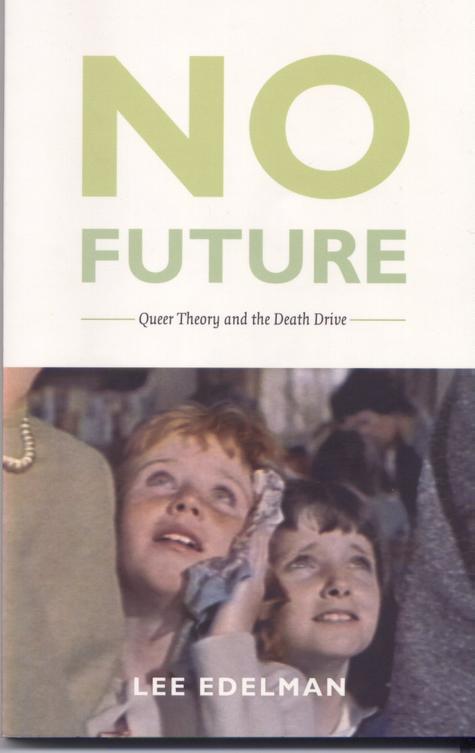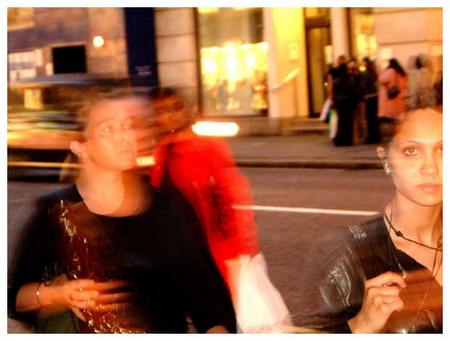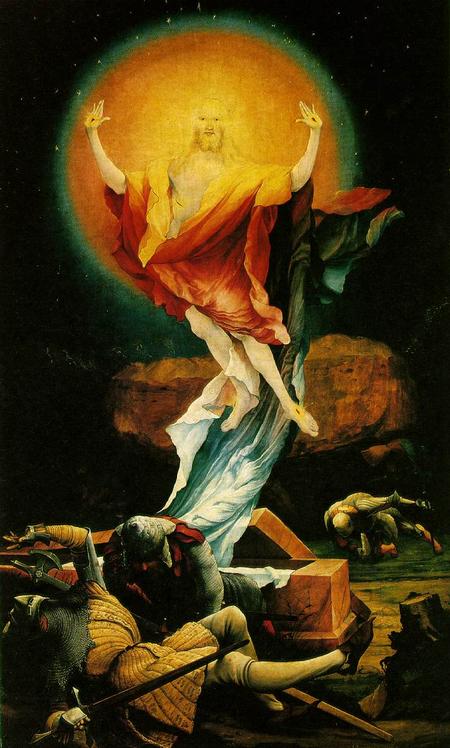February 26, 2005
We aren't the world
Daddy told me look into the future/sit at your computer, be a good girl
A book about the death drive which attacks 'reproductive futurism' and the Child?
No, I don't make it up, honest.
Lee Edelman's No Future: Queer Theory and the Death Drive is, in Lacanian terms, an Impossible polemic. How could anyone not be on the side of the children, of the future, he asks, when the
'child remains the perpetual horizon of every acknowledged politics, the fantasmatic beneficiary of every political intervention. Even proponents of abortion rights, while promoting the freedom of women to control their reproductive choice, recurrently frame their political struggle, mirroring their anti-abortion foes as a "fight for our children - for our daughters and sons," and thus as a fight for the future? What, in that case, would it signify not to be "fighting for the children"?' (2-3)
Edelman's answer is that 'the side outside the consensus by which all politics confirms the absolute value of reproductive futurism' is queerness. In Edelman's analysis, the queer becomes the name for the death drive itself, which as we know from Freud, Lacan and Zizek is not the desire for death, quiescence or calm but, very much to the contrary, that which disrupts all efforts to produce a self-sufficient wholeness. It is what brings death to all systems that tend towards the settled, the unliving force which introduces the Outside into all interiorities.
One of the most powerful aspects of the book is the quotations forcefully equating homosexuality with death and anti-futurism that Edelman unearths from the self-styled Guardians of Civilization . Take, for instance, Francois Abadie, the fomer mayor of Lourdes, who called homosexuals 'those who care nothing for the future ... the gravediggers of society.' Or Father John Miller, author of Called by Love:'Gay activity is wholeheartedly determined to do battle against human life.' And the Pope, on same-sex unions: 'Such a "caricature" has no future and cannot give future to any society.'
Rather than resisting the 'heteronormative' equation of homosexuality with death, sterility and the anti-social, Edelman says that such associations should be embraced. The role of the queer is a structural function for the social order as such, so even if the boundaries of sociality were extended to fully accommodate homosexuality, the disavowed-insistent agency of the death drive would be attributed to/abjected onto another group. Better, then, to take the side of discontent against civlization.
It is not that homosexuals should give up the struggle for rights, Edelman argues, but for this to be the limit of homosexual aspiration would be a total capitulation to the social order. Negotiating for 'acceptance' and 'recognition' from civilization is to grant the social order too much. And the alibi for the authority of the social is not the Father's law, for the contemporary patiarch is now required to legitimate his authority by reference to the emblem of civilization, the Child.
'Thus, while lesbians and gay men by the thousands work for the right to marry, to serve in the military, to adopt and raise children of their own, the political right, refusing to acknowlege these comrades in reproductive futurism, counters their efforts by inviting us to kneel at the shrine of the sacred Child: the Child who might witness lewd or inappropriately intimate behaviour; the Child who might find information about dangerous "lifestyles" on the Internet; the Child who might choose a provocative book from the shelves of the public library; the Child, in short, who might find an enjoyment that would nullify the figural value, itself imposed by adult desire, of the Child as unmarked by the adult's adulterating implication in desire itself; the Child, that is, made to image, for the satisfaction of adults, an Imaginary fullness that's considered to want, and therefore to want for, nothing.' (21)
Hence we are all coralled into holding hands with little orphan Annie and singing rousing hymns to the redemptive telos of 'tomorrow'. Yet tomorrow is indeed 'always a day away': it never arrives, not contingently, but structurally.
The figure who refuses the future is not the homosexual per se, but what Edelman calls, in a Lacanian neologism, the sinthomosexual. The concept of the 'sinthomme' arises, according to Zizek, from Lacan's attempt to answer the question: 'how do we account for patients who have, beyond any doubt, gone through their fantasy, who have obtained distance from the fantasy-framework of their reality, but whose key symptom still persists? ... Lacan tried to answer this challenge with the concept of the sinthome, a neologism containing a set of associations (synthetic-artificial man, synthesis between symptom and fantasy, Saint Thomas, the saint...)' (Sublime Object of Ideology, 75).
Edelman selects Scrooge and Silas Marner in the nineteenth century as examples of the sinthomosexual who are redeemed - which is to say, violently destroyed - through the agency of the Child. In the twentieth century, Leonard (Martin Landau), in Hitchcock's North by Northwest is Edelman's paradigmatic dissenter from reproductive futurism. Unlike Roy Batty in Blade Runner, 'Saint Leonard' refuses to offer the hand of friendship to Cary Grant's Thornhill when he is seemingly about to fall to death from Mount Rushmore. But there is much more at stake in Leonard's refusal than in Batty's, since Thornhill is himself trying to save Eve Kendall (Eva Marie Saint). Leonard's standing on Thornhill's hand is a rejection of the 'reproductive couple' and thus of the future itself.
'In breaking our hold on the future, the sinthomosexual, himself neither martyr nor proponent of martyrdom for the sake of a cause, forsakes all causes, all social action, all responsibility for a better tomorrow or for the perfection of social forms. Against the promise of such an activism, he performs, instead, an act: the act of repudiating the social, of stepping, or trying to step, with Leonard, beyond compulsory compassion, beyond the future and the snare of images keeping us always in its thrall. Insisting, with Kant, on a freedom from pathological motivation, on a radical type of selflessness no allegory ever redeems, the sinthomosexual stands for the wholly impossible ethical act. And for just that reason the social order .... proves incapable of standing him.' (101)
 |  |
One of the great virtues of Edelman's thesis is that it restores the distinction between queerness and homosexuality per se. Edelman goes some way to returning the uncanniness attached to queerness which has been dispelled by the very signifier 'gay' and the cosy, Kylie-loving, unthreatening cheeriness with which it has become associated.
Although Edelman has little to say about capitalism, it is surely not accidental that the production of 'gay' identity over the last twenty five years has coincided with the collapse of effective political alternatives to capitalism. Even though there is no doubt that homosexuality will never be accepted by certain Defenders of Civilization, capitalism (whose relationship to social stability is far from straightforward) seems comfortable with the prospect of 'gayness' as yet another marketing category. Indeed, a focus on sexuality has disippated the political pressure put on the Family itself. While demands are restricted to lobbying for the right to have same-sex 'unions' recognized and to rear children, familial domesticity retains its heterononormative force.
The will to inclusion will only confirm heteronomativity's right to include and exclude. That is why Edelman is highly critical of Judith Butler, who assumes that a wider, more inclusive definition of the human is either possible or desirable. Edelman's point is that the queer is simply that which cannot be included in any allegedly closed 'wholeness'.
When Edelman seeks to articulate this 'unthinkable' position, he describes it as 'against all reason', but it is hard to see why. We only have to recall Schopenhauer's observation that, if reproduction were made a matter of rational reflection then the species would die out within a generation to give the lie to this. It is the reproductive impulse that is against, or at least oblivious to, reason.
It is often not clear whether Edelman is opposed to politics as such or is agitating for a wider definition of the political. It seems to me that, rather than equivocating politics with 'the social' (as Edelman seems to) the true site of political struggle lies in what the dominant order calls the extra-political. When there is only one (permissible) side, it is imperative to locate the Outside.
Of course, children themselves are the first victims of the cult of the Child, since they are permitted only to act in accordance with their signifying function: they are tyrannized by the Future that they are held to represent. (With such a fixation on the Future, and with the Future always understood in bleakly domesteconomic instrumental terms, it is no surprise that depression is endemic amongst western teenagers. And also why 'No Good Advice' was so unexpectedly, nihilistically pertinent: these 'girls with no soul' are 'already wasted').
Also, it is presumably conceivable that reproduction could not lead to an automatic tendency to have faith in the social order and the social subject; however, you are up against two of the most crushing strata acting upon humans - the bio-fascist impulse to 'protect your own' and the social injuction 'to care for children and be happy about it'. (One of the many great virtues of Desperate Housewives is the Lynette storyline, which breaks contemporary taboos by daring to suggest that yes, children are energy vampires, no, motherhood is not innately fulfilling and endlessly wunnerful....)
(A paranthesis: while I read No Future, I was suddenly put in mind of the current 'controversy' whipped up around The Da Vinci Code. We should always be suspicious when 'suppressed' or 'forbidden' knowledge which would supposedly scandalise the big Other becomes so widely disseminated. What we have to ask is, if something is this popular, how can the big Other not know about it? The answer is that this is not the coming to light of subversive knowlege but a shift in what it is now permissible to believe; in other words, in what we are required to believe. If there is a 'conspiracy' it would be to conceal Christ's unplugging from organic community, reproduction and sexuality and to recover him for patriarchy.
Christ's hostility to the Family (not only in his notorious proclamation that we must hate our fathers and mothers, but also in his practice of abducting children from their kinship groups) has always been something of an embarrassment to Catholicism's Procreationist, Pro-life etho-cult. So nothing could be less disturbing, less subversive, than the image of Christ as a family man with sexual urges. Making Christ into 'our contemporary' in this way literally spirits away all of Christ's uncanniness, his queerness.)
Edelman's thesis also cries out to be extended to the Pop which lent his book its name. 'When there's no future how can there be sin?' All due respect to Lydon's subsequent strategies against r and r with PiL, but with that one line - a theopolitical thesis compressed into incendiary pop poetry, a line that, by itself, fully justifies Marcus' prima facie absurd trailing through centuries of heresies and dadaisms in Lipstick Traces, he gave us everything: punk as a destruction of everything we are told is Possible and Inevitable.
Certainly, Edelman explicitly identifies the logic of reproductive futurism as 'poptimism', whose 'locus classicus is Whitney Houston's rendition of the secular hymn, "I believe that children are our future", a hymn we might as well make our national anthem and be done with it.' (143) In fact, though, 'We are the World' might be the better choice for reproductive futurist anthem: we are the world, we are the children (therefore it is OK for us to bomb other people's children - because they aren't the Future.)
How does Rotten's 'No Future' fit with Edelman's? Punk might have seemed, as Jon Savage has said, 'aggressively straight', but its propensity for decoration, scarification and genderbleed, its refusal of sexuality, meant that it was in reality an amplification of a queerness that could then have been seen as an essential defining feature of Pop, locatable in Brian Jones, Glam and then, post-punk, in New Romanticism. Edelman makes the connection between the synthetic (cyberpunk figures outside the 'natural order of reproduction') and his sinthomosexual only in a footnote. Yet there is a surely a fascinating extension of his thesis to be done which will identify the 'sex' Foxx pledged alliegance to in 77 ('my sex is a spark of electroflesh') as synthomosexuals.
The paradoxically sustainable no-future is to be found, not in rock's endlessly dying merry-go-round, but in the thousand plateaus of disco. Savage has claimed that the impossible diagonal lying beyond lumpen punk's 'aggressively straight' anti-sex 'puritanism' and disco's 'hyper-gay' hedonism was Moroder and Summer's 'I Feel Love'. Where white rock was heading into the postmodern no future of endless revivalism, synthetic disco made 'no future' into an erotic art.

Listeners always respond to 'I Feel Love''s eroticism - well, they can hardly fail to - but it is important to recognize that the track's austerely lush cold sensualism is attained by suspending rock's male-derived climax-based libidinal economy. 'I Feel Love' is anti-climactic and anorgasmic, since its bliss is dilated, potentially forever in Moroder's mix which is virtually infinite: the record may terminate, but that is purely a question of physical limitations, which the track implicitly surpasses by flattening the beginning-middle-end of rock narrative sequentiality into the eternal Now of the discontinuum.
Synthetic disco delivered No-Future as dilated Now by making dance not a mating ritual prelude to sex, but a collective practice of decoupling which surpasses it. Anti-fertile, anti-phallic, anti-social:
Nick Land: 'Desocialization waves desolate telecommercial space, until impending human extinction becomes accessible as a dance-floor. What is the scale of now? It isn't a matter of informing the mind, but of deprogramming the body. Amongst the strobes, artificial cool, and inorganic attack beat, dark-side K-war machinery resiliently persists, luring the forces of monopolism down into free-fire zones of fatal intensity, where promiscuous anorgasmic sexualities slide across tactile space, meandering fractally into wet electric distributed conflicts continuous with their terminal consequences.'
February 24, 2005
A fairground's painted swings

Speaking of the pathology of amour, is it anywhere better exemplifed than in the lyrics of 'These Foolish Things' (the title track, significantly, of Ferry's first LP of covers).
What is fascinating about the song's litany of lost affects ('wild strawb'ries only seven francs a kilo ... the sigh of midnight trains in empty stations... a fairground's painted swings') is that the lover features in them only as a series of absences ('a cigarette that bears a lipstick's traces... gardenia perfume ling'ring on a pillow') and is never directly invoked. This, of course, is because there is no 'loved object itself'. What is loved is the petit objet a, which is not a particular object, but the object as such, the 'void presupposed by a demand'. The physical and psychical 'presence' of the lover is required only as that which allows the assemblage of affects to be given an apparent cohering centre. But, in the end, the lover is just that: the space, the canvas, on which the collage of memories and associations can be arranged.
Nevertheless, even though it is not the lover 'herself' that is desired, the lover cannot be dispensed with altogether: otherwise we are in straightforward fetishism. Zizek illustrates the difference between 'normal' pathology and fetishism by reference to that scene in Vertigo where Scotty is embracing Judy (re) made-over as Madeleine. The camera cuts away to show his pausing from kissing her to anxiously check that her hair colour is still blond. But this is NOT fetishism, since the fetishist would dispense with the woman altogether and derive his enjoyment from the lock of hair itself.
Vertigo's horror lies in its unstinting revelation of the artificiality of desire. Scottie can look into the void presupposed by his demands and still, grotesquely, make the demands. That is the difference between Vertigo and many of the film noirs it references, comments upon and surpasses: it is not , in the end, that he is being deceived by a femme fatale, duped into believing that she is something that she is not. On the contrary, he knows full well that there is no Madeleine. But knowledge is nothing, and the explanation for his continued fixation upon a Madeleine that is not even a ghost is the one provided by Zupancic (see this yesterday's post): for Scottie to give up his object would be for him to give up himself, to die.
There is no doubt a specifically male relationship to the objet a which Vertigo reveals. This goes some way to answering the question posed by I.T. a while ago, after Zizek: namely, why would men, given the choice of sex with a monkey or sex with a robot always choose the robot? The more disturbing thought is that men would always in practice prefer a robot to an actual woman - and this is why the libidinal economics, if not yet the technical feasibility, of The Stepford Wives are horribly credible.
The text which most explicitly lays bare this male desiring mechanism is Villier de l'Isle Adam's The Future Eve (1877), which anticipates both Vertigo and The Stepford Wives, as well as Metropolis and Blade Runner.
The story concerns a dissolute decadent who is enchanted with his beloved, Alicia's, form, but who detests what he considers to be the frivolity and shallowness of her personality. He is persuaded by an inventor-mentor figure (given the name, in some versions, incredibly, of the then still-living Thomas Edison) that he should simply accept an automaton-copy of his lover, prepared by the inventor, which will be a perfect replica in every respect, except that it will be programmed to be a stimulating companion.

'Edison' couldn't be more forthright, more demystificatory, more Lacanian: 'the creature whom you love, and who for you is the sole REALITY is by no means the one who is embodied in this transient human figure, but a creature of your desire. ... This illusion is the one thing you struggle against all odds to VITALIZE in the presence of your beloved, depsite the frightful, deadly, withering nullity of Alicia. What you love is this phantom alone; it's for the phantom that you want to die. That and that alone is what you recognize as unconditionally REAL. In short, it is this objectified projection of your own mind that you call on, that you perceive, that you CREATE in your living woman, and which is nothing but your mind reduplicated in her.'
Of course, the 'creative' force that really animates the loved object is not the freeplay of the Romantic imagination, but the implacable mechanism of the unconscious. It's for the phantom that you want to die: but such a 'death' would mean that the desiring frame that makes sense of the world would survive. The only real death would be one in which that whole framework was destroyed, and the subject was confronted with the 'white space' of pure potential.
This is what the subject slaved to the pleasure principle must avoid at all costs. The well-known tedium of Sadean desire is the inevitable consequence when this impasse is honestly confronted. If the object of Sadean desire is, as Zizek, says, the eternally beautiful undead victim, who can suffer all manner of privations and yet be magically renewed forever, then the subject of this desire is, as Burroughs knew very well, the vampire-junky. The vampire-junky must be insatiable and must pursue their desires up to the point of self-destruction, but must never cross the line into annihilation.
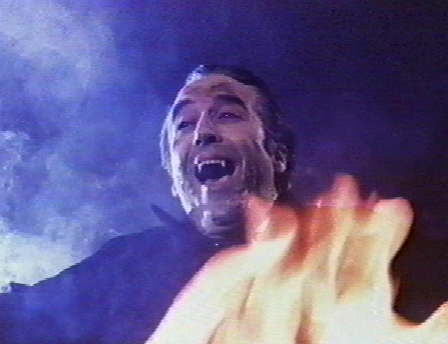
The empirical narrative would have it that the junkie is gradually 'drawn into' addiction, lured into dependence by a chemical need. But it is clear that the junkie chooses to be addicted - the desire to get high is only the ostensible motivation for the drive, just as 'winning money' is only the official alibi for the gambler's enjoyment.
Burroughs' paralleling of love with addiction is thus by no means cynical hyperbole. Burroughs understood very well that, if love is addiction ('If there's a cure for this, I don't want it'), then addiction is also a form of love ('It's my wife and it's my life'). There is always, as Gregory Bateson observed in his essay on alcholism, a meta addiction to be dealt with: the addiction to addiction itself. It is on this that Burroughs' 'control addict' Bradly Martin is hooked: 'I am not AN addict. I am THE addict.'
The lyrical power of Burroughs' writing - especially in the early cut-up novels, which are consensually dismissed as difficult and boring - is often overlooked. But much of its mechanical melancholia is generated from its displaying of the 'foolish things' of desire, the heroin-hacceities of train whistles, radio jingles, billboard images and sexual contact. Although initially random, these affect-collages, when repeated and remixed by memory and desire, become Necessary. Thus only THAT shade of blue for Madeleine's suit, only THAT shade of lipstick on the cigarette tip, will do.
Yes, the painted swings of desire's cruel fairground....
February 23, 2005
'If there's a cure for this...
... I don't want it.... If there's a remedy, I'll run from it.....'
I was reminded of this moment of Diana Ross sublimity - later covered, with all the preposterous hysterical excess we both expected and demanded, by The Associates - whilst reading Alenka Zupancic's delightfully lucid Ethics of the Real.
'Love Hangover' captures that moment in the cycle of being-in-love in which you confront the pathology of the amorous impulse as such; that moment in which you can no longer pretend that you will gain satisfaction from the object.
That is why the title 'Love hangover' is profoundly misleading. A hangover after being drunk is precisely the time when the penitent drinker is likely to groan never again.... But this is exactly the opposite of the feelings the song describes. Ross's cold turkey lover cries da capo, repeat, more of this stuff which has brought me only unhappiness. No, I know I'll never have him, but, yes, I want the misery, the tears, the yearning...
Why?
'The subject,' Zupancic diagnoses, 'is "attached" and "subjected" to her pathology in a way that is not without ambiguity, for what the subject fears most of all is not the loss of this or that particular pleasure, but the loss of the very frame within which pleasure (or pain) can be experienced as such at all. The subject fears losing her pathology, the pathos which constitutes the kernel of her being and current existence, however miserable it might be. She fears finding herself in an entirely new landscape, a featureless territory in which her existence will no longer be confirmed by how she feels.' (9)
Zupancic approaches this pathology - which as she rightly identifies is not the pathology of the abnormal, but very much the pathology of everyday life - via Proust and, inevitably, Kant. At a crucial point in Swann's Love, the hero realises that he does not want to cease suffering for the sake of his thwarted love for Odette, because 'in the very depths of his morbid condition, he feared death itself no more than such a recovery, which would in fact amount to the death of all he now was.'
The inherent conservatism of this desire to 'persist in life' should now be obvious. And don't we see it everywhere, across all layers of culture, from the desires sustaining the persistence of indie ('OK, it's not very novel or interesting, but some people enjoy it...') at one extreme to those supporting the existing order itself ('well, it might be flawed, but it's the least bad, and look at the alternatives').
But as Zupancic points out, via Kant, this desire to 'persist in this life' is straightforwardly irrational: 'Kant's point is that this fear is groundless, since it belongs to the very subject who will no longer be around - should the transition to the ethical take place - to experience this "loss" as a loss.'
Thus the radical Kant beloved of Zupancic and Zizek - the Kant who calls for a new subject position, not a subject that is in any sense restored. The ethical subject is so radical in fact that it cannot even be called revolutionary (even though Kant describes it in such a way): it is not something that turns or returns, but a precisely an empty space, a featureless landscape.
It will be the death of 'you'.
February 19, 2005
Anti-natal, slight return

From the Daily Mail, Thursday.
The current values of the dominant bio-political regime in one slogan.
Motherhood as bio-fascism?
I rest my case, m'lud.
February 17, 2005
We dogmatists
No, I am not tolerant.
No, I do not want to 'debate' or 'enter into dialogue with' liberal democrats, PoMoSophists, opnionists, carnalists, hedonists, mensheviks, individualists....
No, I don't respect you, nor do I solicit such respect for myself from you.
The defenders of tolerance, debate, dialogue and respect advertise their bourgeois credentials with such advocacy. I'm sorry, apolologists for exploitation of labour, but, no, I don't see it as my duty to provide the enemy with a space to express itself. You already have the global videodrome, the judiciary, the police, the psychiatric establishment and the most powerful armies of the world on your side. If that isn't enough, you could always make the effort to build your own profile and audience so you can add to the chorus of approval for the Satanic-worldly. (Too much like hard work? Thought so.)
Be under no illusions: differends, incommensurability, language games, forms of life, very far from disrupting the Dominant Operating System are that operating system in person. Zizek is right about Rorty being right: for all their apparent philosophical wrangles, the political upshot of the theories of Derrida and Habermas (and one can presumably add in Lyotard here) is exactly the same: defence of the liberal values of respect for Otherness etc etc.
Yes, I want to leave all that behind. One of the scandals of Badiou's thought is to announce the blindingly obvious: difference is not suppressed by the established order, it is its banal currency. Fragmentation, deconstruction, cut-up are the very stuff of which mediocracy is made.
So, yes, hold on tight and spit on me, I am a dogmatist.
But what does being a dogmatist entail?
Briefly, it involves commitment to the view that there are Truths. One can add to this, the view that there is a Good.
It's no accident that, since Kant*, rationalism has been held to be synonymous with dogmatism. Post-Kant, we have grown accustomed to the view that critique rather than dogma is the only acceptable ethical and philosophical position, so that 'rational dogmatism' sounds like the worst imaginable insult.
But where does this attack come from? Fundamentally, four interrelated positions: authoritarianism, mysticism, egotism and relativism.
Far from being equivalent to authoritarianism, as the postmodern liberal doxa would have it, dogmatism is only effective alternative to authoritarianism. Authoritarianism and postmodern 'forms of life' entail one another. The familiar PoMo relativist insistence that it is neither possible nor desirable to arbitrate between the different ethical and ontological claims of 'incommensurate' 'language games' surrenders reason to mysticism. Unlike rationalist systems, which proceed from stateable axioms or principles, these 'forms of life' are unable to point to any reasoning which founds them. The sheer existence of these 'discursive communities' is held to be the justification for any traditions and beliefs to which such communities might subscribe. It should come as no surprise that Spinoza was feared and reviled by the authorities of all established religions, since Spinoza used reason alone to prove that the core belief upon which traditional theism was based - that there is a personal, transcendent God who performs miracles and has free will - was irrational nonsense. In other words, it was Spinoza's dogmatism that allow him to overthrow the 'authority' of the Torah.
In terms of contemporary academic philosophy, rationalism is beset not only by Nietzschean-Wittgensteinian-Lyotardianism and Heideggerian Nazi poetico-mysticism, but also by the qualia cult of consciousness. This 'philosophy' replaces the ineffable mystery of God with the ineffable mystery of consciousness. It consists solely in the negative claim that consciousness cannot be explained by either science or philosophy. This is religion in the worst sense.
But dogmatism is religion in the best sense. It is only through dogmatism - ruthless subordination of your Self to an impersonal system - that his majesty the Ego can be crushed. This has been the appeal of nontheistic religion throughout the ages. The Ego is simply authority in miniature (just as political authoritarianism is Egotism writ large), a micro-despot which can only be pushed off his throne by a commitment to sober systematicity.
Finally, it is a mistake to oppose dogmatism to pragmatism. Postmodernism advocates pragmatism at every level: not only at the level of how to get things done (the realm of praxis) but also at the level of what is to be done. But dogmatism is capable of distinguishing between what is to be done - what the goal is - from how this is to be achieved.
*Kant, who begins as a Leibnizian rationalist, is famously 'awoken from his dogmatic slumber' by Hume. The Kantian turn is away from dogma and into critique. Reason is not so much surpassed as arrested. Kant seeks to establish the limits of the thinkable, curbing Reason's alleged hubris, and laying the groundwork for the aporetic pathos-poetics piously peddled by the tragedians of deconstruction and postmodernism.
Yet, as Tim establishes, with his typically concise elegance, Kant has himself been surpassed, by mathematics. Whilst it might appear that the mathematical paradoxes discovered by Cantor and Godel comfortably fit into Kantianism - the idea that 'the Real itself is fundamentally unrepresentable; we can only become aware of “this outer limit of the symbolic”' - Badiou allows us to see that the reverse is the case. For Badiou, that is to say, the mathematical paradoxes 'demonstrate not that what we thought was coherent is actually not, but that what we thought was incoherent is actually rigorously understandable. Unconstructible sets, unique unnameable objects and unprovable statements all seem like they are impossible, but maths shows us that they’re actually perfectly acceptable objects we can talk about without incoherence.'
February 14, 2005
Nick's photographs
Those who haven't should check out the Dissensus thread devoted to Nick Kilroy's photographs.
I've always admired Nick's photography, but the (at least to me) irresistable urge to speed click through images agitates against slow contemplation. All the more reason why we should make a limited edition book of some kind happen.
Philosophers have interpreted the world, the point is to escape from it
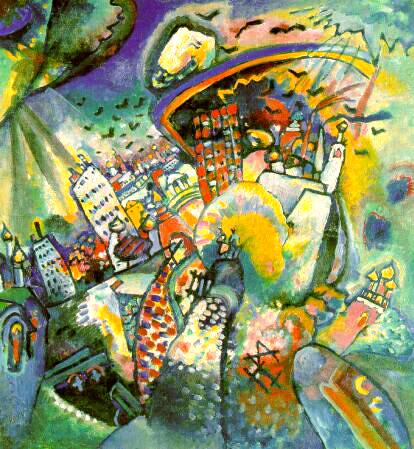
A face-off last Thursday, at the Centre for Research in Modern European Philosophy at Middlesex University, between Badiou (as advocated by the Prince Charming of Cold Rationalism, Peter Hallward) and State Philosophy - Continentalist wing.
Peter situated Badiou's project in the wider sweep of a 'subtractive turn' in French theory. The tendency to subtract, Peter claimed, was a constitutive feature of figures as diverse as Bergson, Sartre, Levi-Strauss and Foucault, but Peter was interested in a particular inflection of this general trend in world-dismantling: a philosophy that aims to strip away 'the worldly', that would tear down the Garden of Earthly Delights.
Such a philosophy finds itself in conflict with the phenomenological tradition stewarded by Hegel, Husserl and Heidegger, even if it wouldn't define itself by opposition to it, given Badiou's well-known exasperation with '"fighting against," ... "deconstructing," ... "surpassing," ... "putting an end to,"'. It's a question of sidestepping that trajectory, which is itself defined by the problematics of deconstructing and putting an end to, and which lures the unwary into its bad infinity of labyrinthine existential despondency with invitations to critique, always critique.
For me, this sets Badiou firmly outside (what has been called) 'Continental Philosophy', which has functioned as a synonym for the three H's and their legacy. In addition to the substantive philosophical differences between Badiou's rationalism and the phenomenology of the Hegel-Husserl-Heidegger axis , the very concept of a philosophy qualified by locality is profoundly opposed to everything Badiou writes.
Peter's decision to focus, in his presentation on Thursday, on Michel Henry and Gilles Deleuze (the subject of Badiou's book The Clamour of Being) was motivated by the claim that, although Deleuze in particular has been seen as breaking out of the Heideggerian intensive death camp, both he and Henry remain caught in the white magical circle of phenomenology.
The Heideggerian project is marked by its fixation on 'positive describable entities', by its yearning for resacralization, for a return of the Gods. Badiou's philosophy, by contrast, is defined by its refusal of Reform at all levels; his substractive ontology is not then part of post-modern/structuralist nostalgia for presence, fullness, authenticity - such nostalgia is nowhere more in evidence than in the denial of the possibility of these states: hence the depressive plaint of the always-already undead: of course, presence was never possible, so of course all we can do is mourn the non-existence of what was never there, nor ever could be... While this pious melancholia turns shilly-shallying lack of commitment into the highest ethical injunction, Badiou's is a philosophy of engagement and active decision. His subtractive procedure is the ruthless evacuation of everything taken-for-granted as a prelude to the construction of a new Good.
Michel Henry attempts a similarly exhaustive ontological extirpation, from an explicitly phenonemonological base, albeit of an aberrant kind. For Henry, whose neo-Gnostic philosophy is expressed in such books as I Am the Truth: Toward a Philosophy of Christianity, the World (and the Worldly) is to be opposed to Life. Naturally, Henry's Life has nothing whatsoever to do with organic life or indeed anything as it appears to us. It can only be felt and suffered, not seen. It can be gestured towards in the abstract art of someone like Kandinsky, but any attempt to constitute it as a positive entity is murder. The worldy is a dark heavy canopy whose soot and gravity snuff the lightness of the Divine spark.
For Peter, the problem with Henry is his retaining of the category of Experience. Henry's Gnostic revelation is precisely felt rather than thought. Badiou's Cartesian conviction is that only concepts and cognition are egalitarian, that is to say, in principle at least, accessible to all. Experience depends upon animal specificity; thought explodes everything local.
Peter argued that Deleuze, too, retains a commitment to Experience. He approached Deleuze's corpus via the study of Bacon, The Logic of Sensation. Bacon emerges as an artist of subtraction: he begins by isolating figures from their 'natural' background before subjecting them to processes of deformation, dissipation, shadowing and smudging so that they end up as abstract streaks. But Bacon's abstraction is a kind of middle way between pure abstraction, which buries the creative spark in geometric formalism, and abstract expressionism, which surrenders form to chaos.
Contrary to what one brow-furrowed Continentalist claimed in the questions afterwards, Deleuze's discussion of this third type of abstraction is not unique to the Bacon book. Neither does his characterization of Bacon depend upon 'mortgating your theory to a dubious history of art', as another Continentalist complained. The abstractive process Deleuze described proceeds logically, not chronologically, and the theorization of abstraction is an abiding fixation in both Deleuze's own works and in his collaborations with Guattari. The mode of abstraction Deleuze advocates is 'the Northern, or Gothic line' theorized by Wilhelm Worringer in Abstraction and Empathy and Form in Gothic.
Worringer's Schopenhauerian history of art placed abstraction first. The earliest art, Worringer maintained, was an attempt to subdue the forces of chaotic Nature with rectilinear forms. As humanity becomes more settled, it develops an 'organic' representational art which centres on the human figure. The Gothic line interrupts this representational repose with an unsettling new form of abstraction, which is neither purely mechanical as in primitive abstraction nor organic as in Greek and Roman representationalism: this barbaric line is uncanny, zigzagging; a 'vitalized geometry'. For Deleuze, is in this line, and in the germinal pulse that animates it, that we are to locate those figures that arouse horror in us through their occupation of an interzone between life and death, animate and inanimate. Nonorganic Life is the throbbing energy formation Deleuze follows through nomad art, Gothic cathedrals, German expressionist cinema and Bacon.
As with Henry, Deleuze is compromised, then, by his reliance upon the pseudo-category of Life - which as Nina rightly said is philosophically AND scientifically vacuous. Like Henry, Deleuze is at pains to distinguish his Life from any life that we would recognize - which begs the question, why use the term at all? Wouldn't 'nonorganic death' serve equally well - which is to say, wouldn't it be equally meaningless?
There's no doubt that Deleuze encourages psychedelic fascism, if he isn't actually guilty of it. From Badiou's POV, there is too much reliance on an Experience of the Intensive. Something like 'Of the Refrain' (from A Thousand Plateaus) is dripping with the the worst type of Nietzscheanism in its vision of a cosmos efflorescing with creative innovation.
But there was always a tension, if not to say a contradiction, in Deleuze's thought between a cold constructivism and a 'hot' creationism. The greatest sleight of hand that he performed was making it appear that Spinoza and Bergson were compatible, never mind complementary. His best pages are always those in which he is at his most Spinozist, which is to say, his least vitalist. The desolated vision of matter as the product of the 'sterile, unengendered' Body without Organs is a machinic restatement of Spinoza's anti-theist cosmotheology. And the BwO is precisely to be reached by subtraction: it is what is left when you take everything away.
Peter positioned Badiou as the theorist with the resources most able to break once and for all with vitalist creationism. By operationalizing Godel and set theory, Badiou's rationalism makes no concessions at all to the worldly or to the empirical. No longer slaved to phenomenal causality, it operates according to an if-then procedure of logical consequentialism.
In terms of Lacanian theory, Badiou is invested, not in the Imaginary (like Wilden, Irigaray, Kristeva) but, with Zizek, in the Real. The too-quick Deleuzian retort to the Lacanian slogan that 'the Real is impossible' misses the crucial continuation of the point: that the Real is impossible but it happens. The Real is what is not computable or countable within the current regime, what is Not-One, what cannot be positively characterized. It can be known only by implication; the echoes of the Kantian noumenal are obvious, and deliberate. (Incidentally, the emphasis on the Not-One is one reason why Peter's opposing of Badiou to Irigaray in the introduction to the Ethics is slightly misleading, I think.)
Badiou's biggest break from Continentalism is in his return to conviction and engagement. Spinoza and (whatever their flaws) Marx and Sartre differ from the mainstream philosophical tradition in their fundamental orientation towards the practical. The Continentalists (who are basically the postmodern equivalent of the German Idealists subjected to derision by Marx, but without the excuse that his Materialist inversion had not yet happened) literally cannot understand this. Their laughable assumption is that Marx can be treated as yet another moment in the development of Idealism. But of course that's what Idealists have to think.
But the Continentalists should be ignored. The most productive area of conceptual discordance is that between Badiou and Deleuze-Guattari. Perhaps we're in a position to use each to decode the blind spots of the other. Deleuze-Guattari have never been properly assimilated into Continentalism (the sad vitalist zombie that stalks the halls of the academy in their name is testament to that) because they too are philosophers of commitment, in which philosophy knows its place: as a theory of action, not a substitute for it.
February 13, 2005
LINX N INVECTIVE
Full transcript of the Power of Nightmares available here.
Interview with Badiou here
Both of which I got from here, which looks very interesting. _________________________________________________________________
Just cancelled the one-way plane ticket I booked the moment I heard that Robbie Williams' 'Angels' had been voted best British single of the last twenty-five years (what kind of a country.....?) when I saw that Vera Drake was beaten for best film at the BAFTAS by The Aviator. At least not all British people are totally fucking stupid, it seems. And it's always heartwarming to see British Filmed Theatre (they call it British cinema these days) getting a kicking, no? Spose that Imelda Staunton winning Best Actress couldn't be avoided (it's considered a patriotic duty to fawn over that simpering ordinary Decent Folk mustn't complain how abaht a nice cuppa tea theatre school shtick, after all). But please God, don't let her win an Oscar, that would be grotesque...
And please, more shots of Leigh's ungracious smug mug when he gets a kicking from Marty.... Scorsese and Leigh both nominated for the same award? If there was any justice, Leigh wouldn't be allowed in the same building....
February 12, 2005
Block the bid
Yet another reason why the Olympic bid MUST fail.
The Bid Experience.
'A hologram of four-times Olympic champion rower Matthew Pinsent.' 'A ten metre fibreglass statue of an athlete.'
How fucking clueless are they? Haven't they learned from the Millennium Experience progstrosity?
Course not.
February 10, 2005
February 08, 2005
R.I.P. Nick Kilroy
'invisible passenger took my hands in dawn sleep of water music - Broken towers intersect cigarette smoke memory of each other... And zero time to the sick tracks - a long time between suns I held the stale overcoat - sliding between light and shadow - Cross the wounded galaxies we intersect, poison of dead sun in your brain slowly fading - Migrants of ape in gasoline rack of history, explosive bio-advance out of space to neon... Pass without doing our ticket - Mountain wind of Saturn in the morning sky - from the death trauma weary goodbye then.'
February 06, 2005
February 02, 2005
HOLLOW MEN

Nietzsche: "'Real are we entirely, and without belief or superstition.' Thus you stick out your chests - but alas, they are hollow!'"
Is there anything more tedious than attacks on religion in general and christianity specifically?
One of the most refreshing aspects of Zizek and Badiou is their unashamed reclamation of aspects of the Christian legacy.
It's worth noting, though, that the relation of both to Christianity is different. The scandal of Badiou's reading of St Paul is that it relegates Christ to a figure of purely formal signifiance (he who is resurrected). Badiou admires Paul for his rigorous extirpation of the 'magician's parephenalia' and hoary rural lore of the gospels. Zizek's relation to Christianity is more ambivalent: is he a believer or not? In any case, both are clear that Christianity, as Zizek says, is too important to be left to the 'Christians'.
If we've learned anything from Nietzsche - and the Last Men to do anything from that are the so-called atheists - it is that, we must always ask: where is a critique coming from? What is the critic asking us to value? What will expresses itself in the critique? Almost no-one notices that, in Nietzsche's parable of the death of God, it is 'many of those who did not believe in God' who sneer at the madman-prophet, smugly certain that they have transcended religious belief.
But, like Marx, Nietzsche understood that what was crucial was not the content of religious belief, but its form. Even in his nineteenth century, Christianity as content was effectively finished. Which is why most of his ire is directed not at the dead shell of the Church but at what it had metamorphosed into: the 'modern ideas' of socialism, egalitarianism and democracy which inherited and completed the task of passive nihilism begun by Christianity's slave revolt in morals.
The bleakest libidinal position of all, the attitude Nietzsche most abominated and feared, was that of perpetual critique, as practised by the Last Man. The 'Last Man' was the European at the end of history, listlessly watching 'the reel as it comes to a close', 'liberated' from the 'illusions' of any particular cultural group, and so free to choose the 'best' from all of them: a bit of zen buddishm here, a dash of steppes shamanism there, seasoned with some kabballah to taste.

Yet what remained uncritiqued in this allegedly hyper-discriminating, hyper-critical stance was the position of the chooser, he who critiques. Who or what is this individual? Why, Oedipus, at last, of course, and, as Deleuze-Guattari point out in Anti-Oedipus, the simperson of Oedipus is our equivalent of primitive tanoos and despotic icons. Oedipus, who believes in nothing but his own subject position, the empty formal space of he who does not believe.
Nietzsche made two major errors in relation to Christianity though.
The first was the one identified by John Gray in Straw Dogs. Unlike Schopenhauer, who rejected Christianity in the name of what were in effect other religious positions - Buddhism and Hinduism - Nietzsche, a little like the pantoGoth God-baiters of today, protested rather too much about his anti-Christianity and his rejection of religion. Nietzsche was the inheritor of Christianity because he believed in History as Progress. It would be the Anti-Christ ubermensch who would emerge as the redeemer.
The second was his flattening out of Christianity into One thing. The 'ascetic ideal', the miserable devotion to 'self-mutilation' is no doubt an aspect of what has been called Christianity. But from the very start, in the conflict between Peter and Paul, between them and the Gnostics, Christ's legacy has been a site of struggle.
An interesting conversation the other week with John Effay and the Dark Prince of Cold Rationalism concerned the issue of what is unique about Christianity. For John, what made Christianity a religion was its rituals: specifically, communion. But for me, what is unique about Christianity is its rejection of ritual. As John Fletcher argues in Situation Ethics, it is the ethical stance of loving others before yourself that makes you a Christian, not any commitment to symbols, rituals or supernatural beliefs. Far from belonging to the 'monotheistic' religion of the Father-Law, Fletcher shows, Christ makes a break from 'Legalistic' conceptions of the ethical. And, as Badiou demonstrates in the St Paul book, there were many surprising affinities between Paul and the Gnostics - crucial to all of which is the differentiation of Christ's stance from that of the cruel and capricious Father-despot of the Old Testament.
The upshot of all this is would be that there are many people who call themselves Christians who are not (Kierkegaard: there are TOO MANY 'Christians') and also many people who call themselves Atheists who are in effect 'Christians'.
The issue shows up the discrepancy between belief and conviction. It is in that discrepancy that ideology does its work, i.e. (in an example close to my own heart atm), 'I don't BELIEVE that education should be dominated by league tables, but that's how it is, so we have to devote all our energy to playing the system, gerrymandering statistics etc.' Ideology does not require belief, only compliance, and if you do comply, that is your conviction.
The challenge of religion is to live your conviction. Kierkegaard's injunction that we leap into faith should be taken less, as is normally done, as a demand for the subsumption of reason into the irrational, but as a call to show fidelity to your conviction. This was what Kierkegaard meant by deriding those who merely 'believed' but who lacked 'inwardness'.
To be genuinely religious is, above all then, to rise to the challenge of consistency. Which is why the Rationalist tradition in Philosophy is religious, whereas the Empiricist tradition, based in commonsense and experience, is atheistic. Hence Spinoza's flattening of ethics into geometry versus Hume's claim that the only answer to the dilemmas of Philosophy was to forget about them and play billiards. More on this soon.
